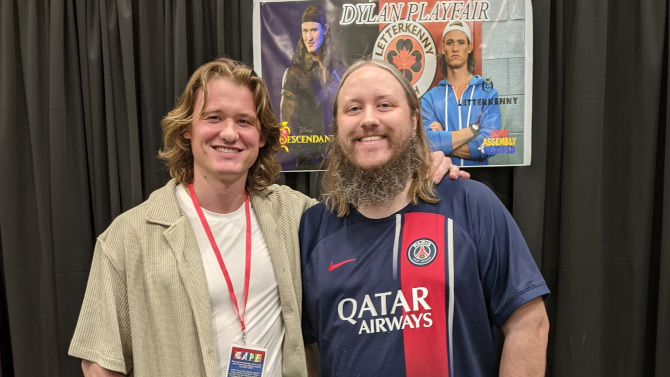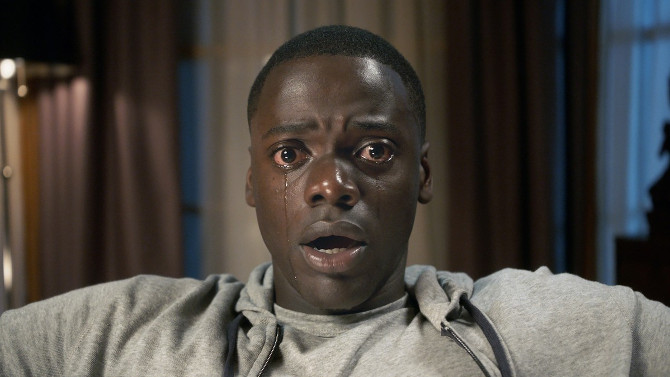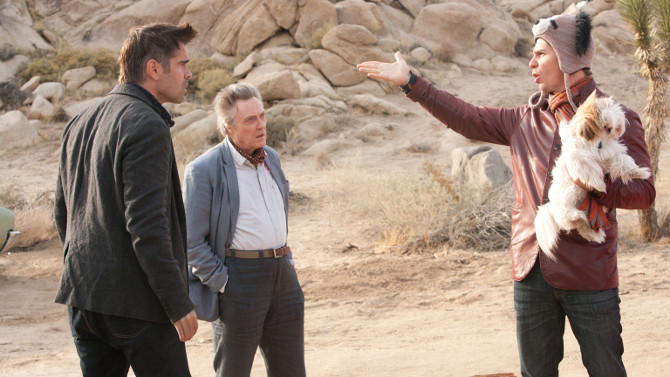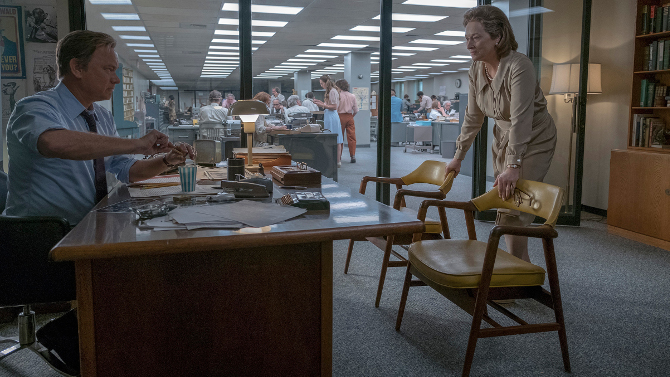
CAPE is 10!
Boy, how time flies when you’re wearing a CAPE, or to be more specific, enjoying yourself at the Cornwall and Area Pop Event, which, like all good things, has returned once more... and is excitingly celebrating its tenth anniversary this year!!! Attracting thousands of pumped up visitors on a rather dreary Saturday, April 26th, 2025, the locale was joyously cheerful thanks to the boisterous crowd filling the place... with a Sunday still to come for those in the Cornwall, Montreal, and Ottawa region.
-

Coming of Age
Call Me by Your NameFebruary 15, 2018The third and final part of filmmaker Luca Guadagnino’s thematic ‘Desire’ trilogy (following 2015's A Bigger Splash and 2009's I Am Love), 2017's Call Me by Your Name once again challenges its audience with themes of love (sometimes first) and loss, desire, sexuality and so much more. Nominated for four Academy Awards this 2018 (including Best Picture), the story, set in 1983, follows seventeen year old Elio (Timothée Chalamet – nominated for Best Actor in a Leading Role), a whip smart, though somewhat aloof and self-conscious teen who is spending the summer with his family in Northern Italy – he is a voracious reader and talented musician (a near prodigy). His father, Mr. Perlman (Michael Stuhlbarg), is an archaeology professor who has invited a graduate student, Oliver (Armie Hammer), to aid him as a research assistant.
-

Stir Crazy
Get OutFebruary 11, 2018A rare horror movie to be nominated for Best Picture at the Academy Awards, 2017's Get Out, written and directed by Jordan Peele, fuses its slow-burner tale with creepy atmosphere, relevant social commentary and touches of comedy, making it so much more than just a straight-forward horror flick. With a story somewhat reminiscent of The Stepford Wives, protagonist Chris Washington (Daniel Kaluuya – an Oscar nominated performance) is an up and coming photographer, an African American twenty-something living a fulfilling life in the big city. In a loving relationship with Rose Armitage (Allison Williams) for the past five months, she has decided to bring him home to meet the folks – a weekend trip that is not exactly the most enticing scenario for the man.
-

Water Feature
The Shape of WaterFebruary 9, 2018There is a scene in 1954's Creature from the Black Lagoon where the female lead, played by Julie Adams, swims through the water. Shot from both above and below, there is a loving elegance to the camera work, and, in a few of the underwater moments, the lighting almost makes it seem as if she is swimming in the nude. Eventually, the Creature appears, and what develops can be looked at in two lights. . . one – that he is stalking her, murder in the monster’s every fibre; two – his movements, mirroring hers, are almost like a sensuous dance, a love-match for the long secluded and lonely Creature. This year’s Academy Award Best Picture contender, The Shape of Water, accepts the second perspective not followed in the Universal horror classic, developing a movie that very much could be its long lost alternate reality sequel. Written and directed by horror maestro Guillermo del Toro, he sews several threads together so that movie afficionados could almost believe that this is the case – perhaps most importantly that it is set only a few years after 1954 (a moment when xenophobic fears were running high with the Cold War at its most tense) and that the creature comes from the Amazon as well. . . while security expert Richard Strickland (Michael Shannon) makes it very clear that it was no easy feat transporting the powerful and mysterious amphibian back to America. Its look is also very much influenced by the horror classic.
-

Following the Paths of Psychos
Seven PsychopathsFebruary 6, 2018One of the most originally creative scripts to be found on either side of Ebbing, Missouri, Martin McDonagh’s Seven Psychopaths, released in 2012, is an example of the writer/director’s many talents (twisty nuanced stories, richly drawn characters, beautiful dialogue, and so much more) that have made his most recent effort, hinted at above, Oscar bait this Awards season. With a screenplay that keeps the audience on its toes for quite a while, we are often guessing what we are truly watching. At first glance a meta cinematic commentary on writing a screenplay – Colin Farrell’s Marty has writer’s block, it is perhaps best summed up after he heads out into the desert with his two buddies. . . leading to one of them, Sam Rockwell’s Billy, describing how his treatment of the script should conclude. With Marty in disbelief at its over-the-top violence, the third friend, Christopher Walken’s Hans responds, perhaps somewhat surprisingly, “It’s got layers, you know. . . it’s got. . . It’s got many layers”. Adding another ‘layer’ of meta, we eventually realize that not all that is written on the page is fictional and that we may be watching flashbacks from several characters’ pasts.
-

Back Space
It Came from Outer SpaceFebruary 4, 2018To provide a reference point, 1953's It Came From Outer Space comes off like a mix between an episode of The Twilight Zone and Star Trek, a science fiction horror tale with a message at its heart. A prime example of the way in which horror movies transformed in the Atomic Age (the fear of nuclear annihilation on the collective consciousness throughout North America and around the world), yet with a unique twist, director Jack Arnold brings Ray Bradbury’s story (adapted into a screenplay by Harry Essex) to vivid life. After the title explodes onto the screen, we meet amateur astronomer John Putnam (Richard Carlson – Hold That Ghost; Creature From the Black Lagoon) and his teacher girlfriend, Ellen Fields (Barbara Rush – she won Most Promising Newcomer - Female, for this film at The Golden Globes), who spot a giant meteor that hits the desert close to his home.
-

Extra! Extra! Read All About It!
The PostJanuary 31, 2018If you were formulating a modern day all-star cast and crew, you couldn’t do much better than The Post. Directed by the legend that is Steven Spielberg (three time Oscar winner and seventeen time nominee, as well as the recipient of the Irving G. Thalberg Memorial Award for “Creative producers, whose bodies of work reflect a consistently high quality of motion picture production”), Meryl Streep (three time Oscar winner and twenty-one time nominee), Tom Hanks (two time Oscar winner and five time nominee), composer John Williams (five time Oscar winner and fifty-one time nominee), cinematographer Janusz Kaminski (two time Oscar winner and six time nominee), and co-writer Josh Singer (Oscar winner for 2015's Spotlight), it is a veritable who’s who of the industry. Tackling the battle between the Washington Post and Richard Nixon’s government of the 1970s, Streep plays Kay Graham, the somewhat reluctant head of said newspaper. A woman in a man’s world, she has a difficult time transitioning from the non-working socialite wife to decision-making newspaper mogul. Tears always seem like they are soon to come as she clumsily drops things and nervously bumbles her way through this confusing world.
